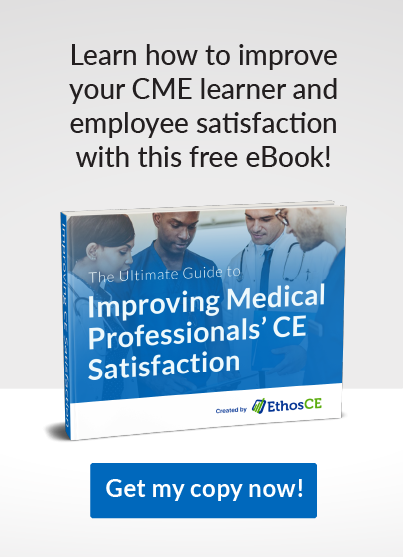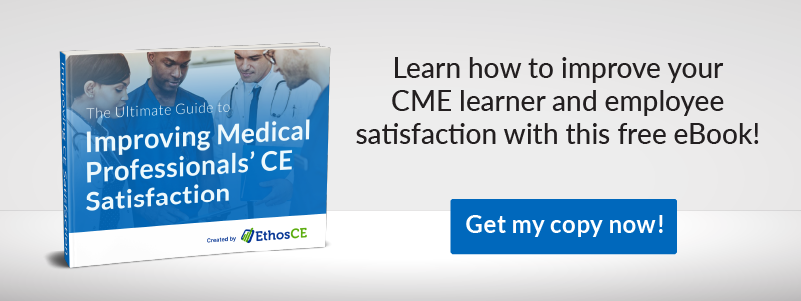5 Benefits of Continuing Education Innovation
Patient needs evolve continuously and so does healthcare provider knowledge. However, is healthcare continuing education keeping up with ever-changing regulations, best practices, and medical knowledge? Innovation in your programs can highlight the benefits of continuing education in your organization, both for individual learners and for your enterprise as a whole. The ACCME is mandating innovation, but what benefits will your organization experience from the process?
According to a November 2019 article in the Journal of Nursing Management, the healthcare industry is “innately risk-averse.” Being careful saves lives, but when it comes to getting the benefits of continuing education, encouraging learners to take risks while in a safe environment may have improved learning outcomes.
Joyce Sensmeier, MS, RN-BC, the article’s author, highlighted the benefits of continuing education in nursing and created an innovation road map for nurse leaders and educators. The model includes encouraging risk-taking, listening to diverse voices, and ensuring autonomy and freedom in decision-making. Sensmeier’s innovation model can work equally well in other healthcare environments. Devoting time to innovating in your CE programs can only strengthen your course offerings and outcomes within your enterprise.
Benefit 1: Keeping Up with the Changing Healthcare Landscape
The global healthcare landscape is changing dramatically. According to Dr. Peter Densen’s 2011 report for Transactions of the American Clinical and Climatological Association, healthcare knowledge doubled every fifty years in 1950. In 2010, healthcare knowledge doubled every ten years, and in 2020, it is doubling every 73 days—barely over two months.
How can providers and support staff be expected to keep up? One way is to incorporate innovative learning strategies that can teach providers how to learn and how to keep their knowledge up to date. For example, a course about, “How to use technology and teamwork to learn how to ask and answer questions,” could be a strong addition to any CE in the healthcare curriculum.
Benefit 2: Improving Patient Outcomes with Lasting Skills
Much has been written about increasing empathy in the healthcare system. Steven Zhang, writing for Stanford Medicine’s SCOPE, discussed how he took a year off from his residency to perform cancer research. He knew that he’d fall behind in current knowledge, but eventually, he learned that he could always fall back on skills of empathy and communication to get up to speed once he returned to active medical practice.
The more that you can incorporate innovative strategies to teach skills like patient empathy, the more effective your CE courses will be. Educators in all sectors are beginning to understand that teaching students how to learn, rather than imparting rote knowledge, produces better long-term outcomes and results. In healthcare, patients can only benefit from providers who have acquired lasting skills from their CE experiences.
Benefit 3: Strengthening Risk Management
No matter which segment of the healthcare workforce that you’re developing CE courses for, having useful legal and regulatory courses will contribute to successful risk management. Often, courses like sexual harassment training or documentation training can be tedious. If learners tune out, the chances of later error can increase. Working on innovative ways to engage CE learners in mandatory training could pay off in significantly reduced risk.
EthosCE supports CE for corporate governance and human resources, FDA compliance, clinical compliance, and food safety compliance. Courses in these areas don’t often share in the benefits of continuing education for clinical practice. It’s challenging to think of an innovative way to deliver food service compliance CE, for example. But according to a 2017 report by Deloitte, food service is undergoing the same changes as the healthcare industry. “Companies can no longer rely on a single function for food safety because . . . food safety is an enterprise-level risk.”
Benefit 4: Improving Care Coordination
Have you thought about creating a CE course that brings different departments or staff functions together? Courses on how to improve care coordination are one way to do this, but they’re just the beginning.
Care coordination is essential for improved patient outcomes and organizational performance. Health industry organizations aren’t alone in experiencing challenges to coordination between roles, functions, and departments. Enterprises in all industries recognize and work to improve problems related to departmental siloing and limited communication.
Benefit 5: Increasing Regulatory Compliance
Regulations from within your enterprise and at all levels of government are a fact of life in the healthcare industry. You can develop courses that can problem-solve in regulatory areas or that incorporate active learning strategies. The latter can shift intellectual knowledge of compliance best practices to greater performance in the workplace.
Healthcare is changing daily. The benefits of continuing education offered through innovative strategies can help train a workforce, improve performance outcomes, and even potentially drive change within your workplace. If you’re providing CE for learner groups, consider new courses or innovative methods of education delivery that can increase your enrollments dramatically once the word gets out about how great your courses are. CE for healthcare is changing along with the overall healthcare field. Some methods used in other environments are a natural fit for healthcare CE. You might find that innovative education strategies, like team-based learning and knowledge scaffolding, can benefit even the driest of courses and mandatory training.
EthosCE believes CME technology solutions should be designed to improve healthcare professionals’ user experience, comply with ACCME guidelines, reduce administrative costs, and demonstrate measurable outcomes.
To learn how EthosCE can enhance the continuing education of your medical professionals, request a free 1-on-1 demo with one of our specialists today!
 We're now part of the Cadmium product suite! Learn more
We're now part of the Cadmium product suite! Learn more 


